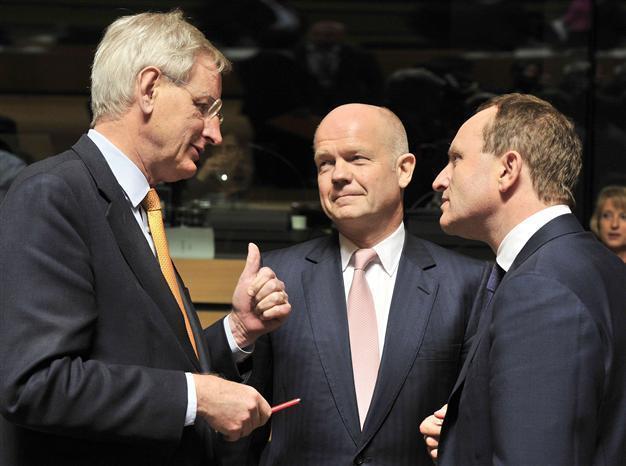EU sees Russia's hand in Ukraine and threatens sanctions
LUXEMBOURG - Agence France-Presse

Swedish Foreign Affairs minister Carl Bildt (L) talks to his Dannish counterpart Martin Lidegaard (R) and UK State secretary for Foreign and Commenwealth Affairs William Hague (C) prior to a Foreign Affairs Council on April 14, 2014 at the EU Headquarters. AFP Photo
The European Union discussed fresh sanctions against Russia on Monday as foreign ministers angrily blamed Moscow for fomenting trouble in restive eastern Ukraine while holding out hope of a diplomatic breakthrough."Further sanctions have to be the response to Russia's behaviour," British Foreign Secretary William Hague said on arriving for talks with his 27 counterparts. "There have to be consequences."
Events of the last 48 hours in eastern Ukraine, where pro-Kremlin militants have seized official buildings in orchestrated attacks, are "clearly a further escalation of the crisis," Hague said.
There could be no "doubt that this has been planned and brought about by Russia," he said, adding that Russian denials of involvement "do not have a shred of credibility."
Lithuanian counterpart Linkus Linkevicius, whose Baltic nation takes a hard line on Russian meddling after being occupied by its large neighbour, said Europe was seeing "signs of state-owned terrorism" and "must use all leverage."
"We must not (concentrate) on washing the dishes when the house is on fire," said Linkevicius as Swedish hardliner Carl Bildt said that "if they escalate, I think we should escalate."
A draft statement on Ukraine put to the bloc's 28 ministers suggested adding more Russians to an EU blacklist of 33 people subjected to an EU visa ban and asset freeze.
It also reiterated that any further steps by Russia to destabilise Ukraine "would lead to additional and far-reaching consequences" on economic ties.
But some ministers appeared reluctant to toughen reprisals against Russia by moving up a stage to economic sanctions, preferring diplomatic options ahead of planned talks in Geneva on Thursday.
"With sanctions, we are not going to solve the problem," said Luxembourg's Jean Asselborn, stressing that everything must be done to ensure the success of the EU-US mediated in Geneva between Russia and Ukraine.
"We must not focus only on sanctions," Asselborn said as Dutch Foreign Minister Frans Timmermans also argued it was "too early" to discuss fresh sanctions but the EU needed to be prepared should Russia show no sign of backing off.
As pro-Kremlin militias continued in control of many government buildings in defiance of a Kiev ultimatum to leave or face the consequences, the ministers stuck to a pledge to help Ukraine's interim government, approving a one-billion-euro package to help overcome the country's deep financial problems.
And in a further move to revive the flagging Ukrainian economy, the ministers also signed off on a plan to lower customs duties on Ukrainian goods that could save the country almost 500 million euros a year.
The medium-term loan of almost one billion euros ($1.4 billion) -- part of a total 11 billion euros in assistance -- aims to help cover Kiev's balance-of-payments needs and comes in addition to 610 million euros of aid that has been approved but not yet disbursed.
The cut in trade tariffs for Ukrainian imports until November 1 is a one-sided measure that will not affect duties on exports to Ukraine from the 28-nation bloc.
It is a first stage in a free-trade pact due to be signed by Brussels with Kiev later this year which was linked to the EU-Ukraine Association Agreement that former president Viktor Yanukovych refused to sign in November, triggering the protests that led to his ouster.
Meanwhile, four people were added to a list of 18 Ukrainians subject to an EU visa ban and asset freeze since March 5 for misappropriating Ukrainian state funds.
There were no immediate details on the four but EU diplomats said they were Ukrainians who, along with the other 18, were targeted by judicial investigations for fraud against the state.
















